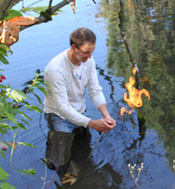Teaching
Biology 358
Microbiology lecture and laboratory emphasizes prokaryotic cell structure and function, gene regulation, horizontal gene transfer and host-microbe interactions.
 Igniting methane produced by Methanogens of the domain Archaea living in the sediment of Reed Canyon Lake. |
Catalog Description: Full course for one semester. The biology of microorganisms, emphasizing prokaryotic anatomy, growth and cultivation, metabolism, genetics and gene regulation. Lecture topics include bacteria-to-bacteria signaling, biofilms, secretion, host-parasite interactions, microbial diversity, bacteriophage biology, and the use of phage as genetic tools. Lectures are supplemented with readings from the primary literature. Laboratory exercises demonstrate principles covered in lecture and instruct students on research techniques. An advanced, independent research project is required. Prerequisite: Biology 101/102, Chemistry 101/102. Lecture-laboratory.
Recent Independent Projects
Isolation of bacteria from the Reed Reactor to determine radiation resistance
By Ayden Romero and Sophia Subramanian, Spring 2025
How Soil Use Alters Soil Microbial Diversity
By Ginger Priestman and Marianna Tijerina, Spring 2025
Preliminary Screening for Enzymatic Candidates for PET-Degradation
By Luisa Morgan and Simone Merani, Spring 2025
Investigating the Carbon Sources Involved with Methane Production in Reed Canyon
By Brennan Hunt and Connie Mangan, Spring 2024
Activity of P Phytophthora lateralis in the Reed College Canyon: An assessment of tree health and disease transfer
By Rune Houston and Cecile Szollas, Spring 2024
Growth of Biofilms on Synthetic Fibers by Polyethylene Terephthalate Degrading Bacteria
By Miranda Kubek and Diya Mandyam, Spring 2024
Antimicrobial activity of lichen phenolics in the selection of host-specific microbiomes
By Katie Riley and Meredith Hastings, Spring 2024
Effects of the biosurfactant saponin on bacterial biofilm consumption of PET plastic
By Sophia Barbour-Weiss, Spring 2022
Detection of Salmonella from different food species by polymerase chain reaction
By Timothy Chao and Shota Wetlesen, Spring 2022
Antibiotic Sensitivity in Various Clinical Strains of E. coli Across Geographical Distance
By Mackenzie Swiecki, Spring 2022
Doing the Dirty: Examining Bacterial Soil Diversity in the Pacific Northwest
By Emilie Badener, Emma Campbell, and Ethan Myer, Spring 2022
Prediction of Secreted Lipases in PET Degrading Bacteria
By Henry Scheffer, Spring 2020
2019-nCOV Therapeutics
By Katherine Descant, Spring 2020
Developing a Vaccine Against SARS-CoV-2
By Mila Trank-Greene, Spring 2020
Eating Plastic, It’s Fantastic
By Jamie Lindner and Raina Sacksteder, Spring 2019
Urbanization: Effects on Microbial Diversity
By Meredith Theus and Sawyer Lythcott-Haims, Spring 2019
Effect of CBD on EPEC adherence to human epithelial cells
By Ben Patterson and Claire Milander-Mashlan, Spring 2019
Effects of temperature-induced transformation on the voltage generation and morphology of Shewanella oneidensis MR-1
By Gavin Dury, Spring 2019
Microbial diversity in the Portland Harbor superfund cleanup area
By Mary Snook, Spring 2018
The Bugs in Your Bread
By Cam Roberts and Avery Van Duzer, Spring 2018
Host Specificity and Degeneracy in Phage Isolated Against Pseudomonas spp
By Peter McIlroy and William Scott, Spring 2018
Jay Mellies, Why so Red: Interrogating the Genetic Basis of Prodigiosin in Serratia marcescens
By Hannah Bronstein and Arek Rein-Jungwirth, Spring 2018
Biology 431
Seminar on Bacterial Pathogenesis. An examination of how bacterial pathogens interact with host organisms in order to cause disease. Topics include adhesion, colonization, invasion, toxins, subversion of host cell signaling events, immune evasion, persisters, and bacteria-to-bacteria communication as they pertain to pathogenesis.
Biology 463
Immunology is a primarily lecture, conference course that will address basic principles of mammalian immunity. One inquiry-based laboratory exercise to investigate interleukin-2 production by lymphocytes will be conducted over two, regularly scheduled class periods.
Catalog Description: One-half course for one semester. A discussion of the properties of innate and adaptive immunity, the cells of the immune system, antibody structure and function, antigen recognition, lymphocyte activation and immunity to microbes. Topics also covered will include immunodeficiency and AIDS, and transplantation. An inquiry-based laboratory exercise will be required. Prerequisites: Biology 101/102 and one of Biology 358 or 372. Lecture-laboratory-conference.